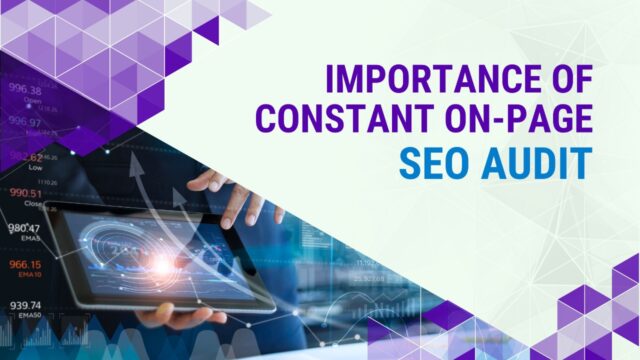
When you are implementing online marketing, the base of all that comes down to Search Engine Optimization (SEO). It is the science that helps you get found in online search results.
SEO is not a one-time shot, but an on-going process that evolves with how markets and consumers evolve and how business functionalities and web specifics change.
On-Page SEO – Laying the Foundation of Your Entire SEO Strategy
There are two verticals in SEO – On-Page and Off-Page SEO. On-Page SEO is all about what you do within the site, while Off-page SEO is what you do outside of it.
So, do you think getting all the aspects right in your On-Page SEO implementation once is enough? Will you focus only on Off-Page SEO afterward? Well, many markers go about this. But this is not right. Especially in today’s cut-throat online marketing competition, when there are new dynamics and methodologies being introduced in SEO more often.
So, should you update your On-Page SEO time and again? The definitive answer to this is – Yes.
Why Do You Require Constant Update to Your On-Page SEO Factors?
The way people search is constantly evolving. Google and other search engines consistently update their algorithms. And therefore the way search engines deliver answers to the search queries is constantly changing. This is where you need to keep up with the updates. You can’t just sit back and rely on your old product and tactics to attract attention and sell.
In order to keep up with the user-intent and consumer behaviors, you need to update your site’s SEO factors to keep everything aligned to protect the rankings.
However, all this needs to be done with a strategy behind the optimizations, with a clear metric of what needs to be fixed, what needs to be tweaked, and what needs to be updated and added.
When you are working with a professional SEO company, they will tell you how on-page checks and tweaks at regular intervals are a key strategy behind their plan of action in the on-going SEO implementation of a particular site.
Now, the question arises – How often should you update your On-Page SEO? Let’s talk about the reason and method to do this.
What Factors Affect On-Page SEO?
Page redirection, product addition or change, canonical tags, page load speed issue, broken links – there are several reasons that could affect your on-page SEO factors, and this is what you need to keep your eye on.
- The Ranking is Going Down Drastically – If you are observing that ranking and inbound traffic from organic results is going down extremely then it means that something is wrong with your SEO. While this could be because of Off-Page or On-Page SEO, you have to conduct a thorough SEO audit to get to the root cause of the problem.
- Site is taking Too Long to Load – When the site or a particular page is taking too much time to load then it means that your bounce rate is going upward, and it needs a rejig fast.
- There are Security Issues – Site has been hacked, or there are issues with payment processes, or the information has been compromised; it means the security is not up-to-date.
- Not Compatible with Mobile Devices – More than half of the organic visits now come from mobile devices, and if you are running an old website that doesn’t get accessed in a similar way from mobile devices, you are lacking behind.
- Now Having Robust SEO – No addition of new keywords, no blog update, no content refreshment, bad URL structure, no proper tags, missing H1 tags, missing image alt text, old and illogical website structure, issues with site navigation, missing or broken links, and many more; all these are on-page SEO factors that need to be top-notch at all times to keep your site up-to-date and aligned to keep your rankings and traffic up.
How Often Should Your On-SEO Be Updated?
Should you do it daily? No, not at all. That would be a waste of plans and resources which could be allocated and used in other critical activities. However, issues can crop up anytime, and there are times like search engine algorithm updates and your weekly or monthly ranking metrics that would give you a clear idea of how often you should update your On-Page SEO.
- Big Sites Need More Frequent SEO Audits and Update
If you have a big site, meaning one with hundreds of pages, then on-page issues could be far more common compared to smaller websites. Larger sites mean more people are involved with it and therefore greater the chances of knock-offs.
For a bigger site – Weekly audits become essential to check with the on-page SEO, find issues and fix them; as well as implement any required updates.
- Keyword Research Strategy
Keywords are the core and key elements of what your target audience is searching for, concerning what you sell and service. No benefit if you are ranking for a keyword that no one is searching for. Thereby, the keyword research strategy has to be revisited every once a month to check if your website content is keyword-relevant or if you need changes to that.
- Product Changes
When you are adding new products, updating your product listing, or when stock levels are leading to issues like 404 redirects and errors, then it has to be updated. Ensure to run an update once every week.
- Changes in Algorithm
If there has been a recent Google algorithm update or from any other search engine, then you need to check through your site if it complies with the new regulations or needs changes and updates. This audit should be done once before and once after.
- Keep Checking Competitors
It goes without saying that as a dedicated marketer, you would be keeping an eye on your competitors’ sites, rankings, and traffic. If you are noticing that they are doing well, then it is time you look at your optimization strategy and find the gaps. Do this audit once a month.
- Changes in Website Architecture
When you are going to implement a structural change to your website, like migrating it to another host, making server changes, disavowing backlinks, reorganizing categories and sub-categories, a comprehensive on-page audit becomes important, before and after, to know how it affects your SEO. - Strategic On-Page SEO Audit and Update
Even if there isn’t a critical reason to go for an audit right away, a comprehensive On-Page Audit once per month is important for you to measure the performance against past results. Also, this helps to find and fix underlying issues, and make some necessary changes in content, keywords, and backlinks that you think should be done.
Conclusion:
Monitoring the impact on your On-page SEO is important, and therefore keeping an eye on minute-to-major issues is something that you need to do regularly. Update your content regularly keeping up with keyword traffic, competition, and search-intent update, and ensure that you update your blog section regularly.
On-Page SEO is the most critical part of online marketing and lays the foundation of your Off-Page SEO strategy. Consult this in-depth with your SEO agency, and enquire about what process they follow for this.






























